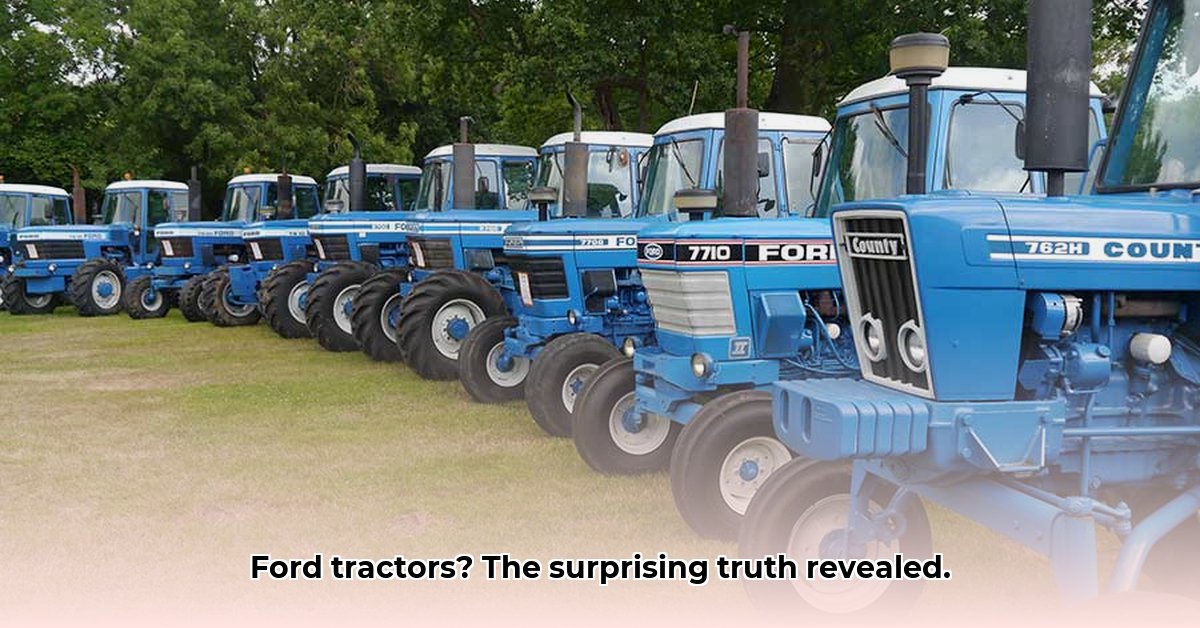
Does Ford Make Tractors? A Legacy of Innovation
The question of whether Ford makes tractors isn't simply a yes or no answer. While Ford no longer manufactures tractors under its own brand, its indelible mark on agricultural technology remains, profoundly shaping modern farming practices and the pursuit of sustainable agriculture. This legacy continues through New Holland Agriculture, a testament to Ford's pioneering role in mechanizing the farm. For more details on Ford's tractor history, check out this dedicated site.
Ford's Unexpected Farming Revolution: The Fordson and Beyond
The early 20th century witnessed a dramatic shift in agricultural practices. Before Henry Ford's intervention, farming was intensely labor-intensive, relying heavily on animal power and manual labor. This limited productivity and efficiency, especially for smaller farms. Ford's entry into the tractor market, with the introduction of the Fordson tractor, marked a paradigm shift. The Fordson, launched in the early 1900s, offered farmers a robust, relatively inexpensive, and reliable alternative to animal power. Its mass production, a principle Ford perfected in the automotive industry, made tractor ownership attainable for a broader range of farmers. Subsequent models, such as the iconic 9N and 8N, further solidified Ford's position as a leader in agricultural mechanization. This period showcased Ford’s profound impact on increasing farm efficiency and affordability. Did this early mechanization contribute to the eventual consolidation of farmland ownership? Further research is needed to fully assess the long-term sociological impact.
The Farm Crisis and Ford's Strategic Retreat
The agricultural landscape experienced a significant downturn in the 1980s, a period often referred to as the farm crisis. This challenging economic climate forced many smaller agricultural equipment manufacturers out of business and spurred a wave of mergers and acquisitions among larger players. Despite its strong legacy, Ford's tractor division faced mounting pressure. This difficult economic environment, coupled with a strategic decision to refocus its core business, led Ford to sell its tractor manufacturing arm to Fiat in 1985. This marked the end of an era for Ford tractors, but not the end of their influence on the agricultural world.
The Enduring Legacy: New Holland and Sustainable Agriculture
Fiat's acquisition of Ford's tractor division wasn't simply a business transaction; it was a pivotal moment in agricultural history. Fiat, already the owner of New Holland, inherited a wealth of Ford's technological expertise, brand recognition, and established customer base. Therefore, while you won't find a new Ford tractor at your local dealership, the spirit of Ford's innovations continues to thrive through New Holland. As part of CNH Industrial, New Holland remains a significant force in the global agricultural machinery market, building upon the foundation laid by Ford's pioneering efforts. This legacy indirectly shapes farming practices worldwide.
Sustainability and the Long Shadow of Ford: A Complex Legacy
Ford's early tractors, while revolutionary in boosting efficiency, also presented new environmental challenges. Increased fuel consumption and soil compaction, for example, need to be considered when evaluating their full environmental impact. The industry consolidation of the 1980s also presents a complex area for further study. Did this consolidation lead to a decrease in innovation or facilitate greater economies of scale and advancements toward sustainable practices? These are questions worthy of ongoing research, illuminating the long-term effects of Ford’s contributions to agriculture.
The Future of Agriculture: A Sustainability Focus
The agricultural machinery industry faces growing pressure to adopt more sustainable practices. CNH Industrial, New Holland's parent company, recognizes this imperative and is investing heavily in research and development focused on producing greener designs. This commitment goes beyond technological advancements; it reflects a growing demand from farmers for equipment that minimizes their environmental footprint. Government regulations and the influence of environmental advocacy groups further expedite this shift, promoting stricter emission standards and sustainable agriculture methods. The future trajectory of sustainable agriculture hinges on collaborative efforts – from manufacturers to farmers, policymakers, and environmental advocates.
“The shift toward sustainable agriculture is a continuous process, requiring ongoing innovation and collaboration across the entire value chain,” states Dr. Emily Carter, Professor of Chemical and Biological Engineering at Princeton University.
How Did Ford Tractor's Legacy Impact Sustainable Farming Practices?
Ford's impact on agriculture extends beyond simple mechanization; it laid the groundwork for modern sustainable farming practices. The Fordson tractor's accessibility revolutionized farming, allowing smaller farms to adopt mechanization and boosting overall productivity. The three-point hitch, introduced with the Ford 9N, further enhanced efficiency by simplifying implement attachment.
While early mechanization improved efficiency, it also presented challenges such as increased fuel consumption and soil compaction. Present-day practices, however, continue the legacy of Ford's initial innovations, incorporating updated technologies to address the original environmental concerns. Modern tractors, inspired by Ford’s designs, feature fuel-efficient engines, precision farming technologies (for optimized fertilizer and pesticide application), and the exploration of alternative fuels like biofuels.
Key Takeaways:
- Ford's mass-produced tractors democratized mechanization in farming, impacting productivity and food security.
- The three-point hitch invention significantly improved operational efficiency and implement adaptability.
- While Ford exited the tractor manufacturing sector, its influence continues through New Holland.
- Modern sustainable agriculture builds upon the foundation established by Ford, addressing early mechanization's environmental impacts through technological innovations.